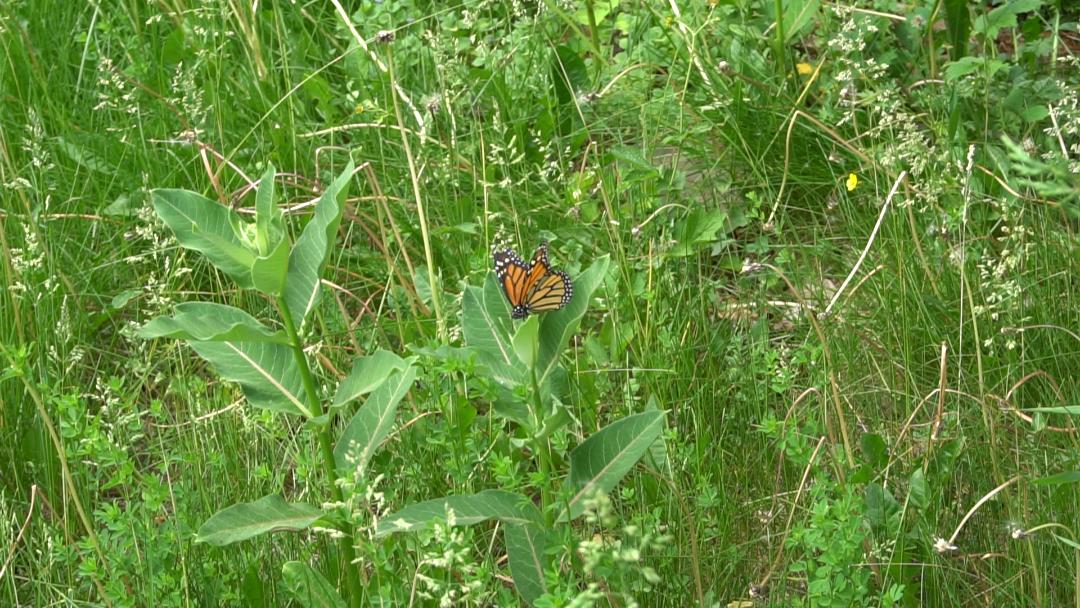On August 15, I published an article about Antheia, a long-time homeowner in Burlington who has been maintaining a naturalized area in her front yard since 2015. The City of Burlington has repeatedly told Antheia she is in violation of Burlington’s bylaws, despite the bylaws allowing for naturalized areas. According to Antheia, “Every year they mischaracterize my naturalized area as a lawn and demand that I cut everything down to less than eight inches or they will come and do it themselves and charge me.”
After discussions with the bylaw supervisor in July 2019, Antheia was assured her property was being maintained as a naturalized area and was in fact in compliance. One month later, after allegedly receiving many complaints from neighbours, the city sent Antheia a letter demanding she cut everything — all the same plants that were in her yard when the city deemed it in compliance — to less than eight inches or 20 centimetres. She had until August 20 to comply.
On August 16, while Antheia was exploring options to save her plants, the city cut six feet of her naturalized garden to less than an inch or 2.5 centimetres in height. No plants were spared, and the devastated milkweed were carted away to be composted — undoubtably with Monarch eggs or caterpillars clinging to leaves and stalks.
On August 18, I published the story of Paul Raun and his garden. Three-quarters of Raun’s front yard has been naturalized and is home to over 23 kinds of wildflowers, 12 types of shrubs and vines, three varieties of wild grasses, a sycamore tree and a redbud tree.
Raun purchased his wildflowers from reputable, qualified nurseries who specialise in indigenous plants. But, on August 14, Raun received notice that he was in violation of bylaw 59-2018 which states grass and ground cover must be cut to a height less than eight inches, or 20 cm. He had seven days to comply.
Raun made many attempts to speak with the bylaw officer, and finally heard from her the day after my article went online. Arrangements were made for two bylaw officers to visit Raun’s garden on August 21, to confirm which plants constituted weeds under the bylaw.
After learning about what happened to Antheia’s garden, Raun took two days off work to keep an eye on his plants.
Not surprisingly, not one of Raun’s plants was considered a weed. The bylaw officers did voice concerns over a vine growing along the side of the yard and some cypress trees growing along the property line. Both the vine and the cypress trees belonged to Paul’s neighbour. No action was taken regarding these two violations.
In his backyard, Raun was asked to move rose bush and tree trimmings further away from his house and to cover them with soil. He complied with this request. According to Raun, “With respect to the wood pile, it consists of branches from a dead rose bush that had grown along the side of our back deck as well as low-hanging branches that I trimmed off a redbud tree. The bylaw officer suggested that I bury it just in case a neighbour complained about it.”
Raun says,
“With respect to the discrepancy between the original order and the subsequent positive evaluation that bylaw officers Ibrahim and Natalie gave our native plants garden, it may have had to do with Natalie’s lack of knowledge about plants. With respect to the need for a more detailed bylaw related to naturalised gardens, it is crucial to spell out the grounds on which one could have a wood pile consisting of cut branches and how far away it would have to be away from neighbouring dwellings, in addressing the issue of harbouring creatures at odds with the interior of one’s dwelling.
With further respect, the rule for a two-feet buffer along property boundaries needs refining to consider a variety of potential scenarios. The officers raised no complaint about the wild grapevine growing along our southern fence along with wildflowers and wild prairie grasses spreading right up to it without a two-foot buffer. Why is it acceptable to have a fence running along a property line but not a row of shrubs to which any wild-flowers or tall grasses can run up, albeit kept a tiny bit back?”
Both these situations, and many more across Burlington, are prime examples of the current bylaw being used by neighbours to harass and bully individuals embracing ecological landscaping into complying with unsustainable grass monoculture that permeates the conservative, eco-unfriendly city of Burlington, Ontario.
Doreen Nicoll is a freelance writer, teacher, social activist and member of several community organizations working diligently to end poverty, hunger and gendered violence.




